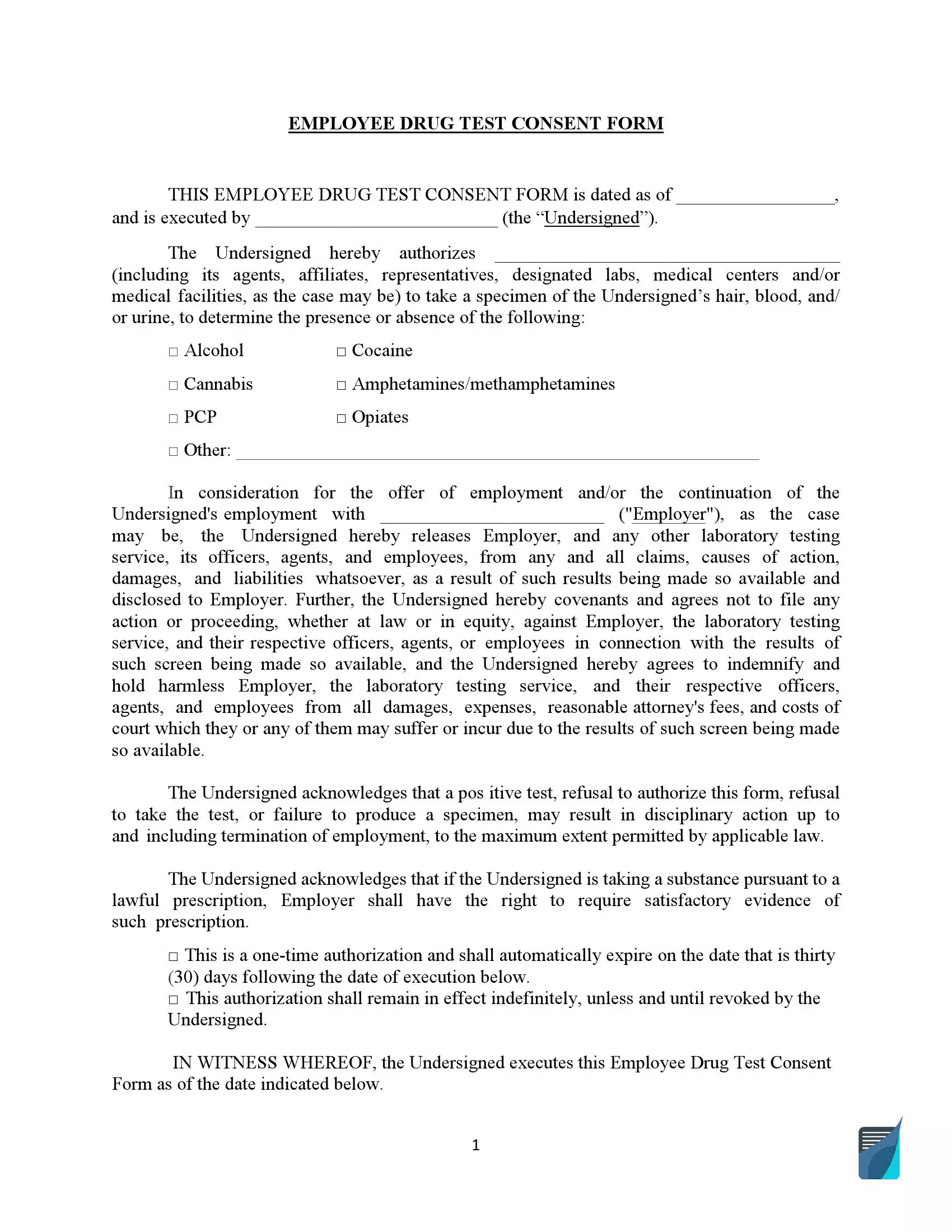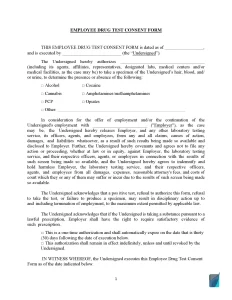Drug Test Form
In industries with a high risk of injury or where access to drugs or alcohol can negatively affect the workers, employers can consider a drug-free workplace policy. To ensure this, usually, companies incorporate drug and alcohol testing into their work processes.
It is proven to be an effective tool to decrease injury-leading accidents and absenteeism and, therefore, enhance productivity and safety. However, not all employees will love the idea of screening. Besides, the employer must first get authorization from a worker before administering any tests, as no lab will have the right to disclose the test results without the individual consent.
The employer must have a reasonable explanation for why they need a drug test. Also, they need to ensure the information they require will be kept confidential.

Build Your Document
Answer a few simple questions to make your document in minutes
Save and Print
Save progress and finish on any device, download and print anytime
Sign and Use
Your valid, lawyer-approved document is ready
Drug and Alcohol Testing Laws
The process of getting the employee’s consent is regulated by the federal Drug-Free Workplace Act of 1988, and the refusal to give permission can cause the termination of employment. In some states, the law restricts such employees from getting unemployment payments due to previous job termination.
On the other hand, some states can strictly forbid random drug testing or screening for specific substances. Any company that intends to incorporate a drug or alcohol test system in their hiring process and internal policies must first verify if this is a legal action in their field and the state-specific requirements allow so.
What Is the Drug Test Process?
In certain situations, as part of a hiring process, randomly or due to a reasonable suspicion that the employee has been at work under the influence of illegal substances, the employer can request the worker undergo drug and alcohol testing. The person needs to send their blood, urine, or saliva samples to the testing laboratory to check if there is any substance abuse.
The laboratory may check for a specific drug or a list of restricted substances, including alcohol. The employer will receive the analysis results only if they obtain the consent form from the employee.
What Are the Types of Drug Test Consent for Employees?
Usually, the employer gets the employee’s consent at the beginning of the contract with an open date, which gives them the right to request the worker undergo a drug test if they suspect that the worker presents at work under the effect of illegal drugs. Here are the most typical situations when an employer can ask employees or new hires to agree to a drug test.
Pre-employment Drug Test Screening
While making the prescreening of the new employer for some industries is a prerequisite requirement, it is an optional feature for other private businesses. Any employer is encouraged to consult the state laws before providing the pre-employment screening, as regulations can vary for specific states.
In most cases, it is recommended to ask the newly hired person to sign a consent form for drug testing only after the candidate accepts the job offer. It is usually made to prevent discriminatory thinking during decision-making. To ensure that it will not cause frustration on the employee’s side, it’s recommended to inform them beforehand in the job description, during the interview, or on the website.
While an applicant can refuse to take a pre-employment drug test, employers also are free to drop such applicants from consideration for employment. Additionally, employers can withdraw job offers from candidates who fail the drug test. A candidate has the very right to refuse to undergo the pre-screening test, which usually results in revoking the job offer.
Drug Testing of Current Employees
This type of testing can also be divided into several circumstances: one-time testing due to the incident, scheduled drug testing, or random drug tests for employees. However, make sure that the company policies correspond to the local regulations to ensure that all procedures are legal and permitted by law.
- One-time testing
This drug test is usually issued when there is a need to investigate the cause of the on-the-job accident. The employer has reasons to imply that the employee has been under the influence of alcohol or drugs. In case of positive drug test results, the employer can refuse to provide insurance coverage and release from liability.
Additionally, the employer may require a drug test if the employee’s behavior is erratic, unstable, or there are visible symptoms of drug use. In most cases, the employer has standing consent from the employee, but it’s needed to request signing a consent form in case of its absence.
- Scheduled drug or alcohol testing
In the workplace where employees have direct contact with drugs and alcohol (for example, medical care, pharm, or FBI), the official policies require all workers to conduct a scheduled drug and alcohol testing.
- Random testing on workplace
Random testing implies using the auto-generating selection process of the workers who will undergo the test for substance use. The laws regarding drugs and alcohol testing vary from state to state, and the company’s policies must comply with the law. Keep in mind that random drug testing is not allowed in California.
When Employer Cannot Hold a Drug Test
Despite popular thought that it’s better to prevent the issue than to deal with it, it is not always applicable to such a sensitive case as requesting for invasion of personal privacy, which a drug test inherently is.
There are cases when employers abuse their power with a good intent to secure their business and make silly mistakes. Here are situations when it is better to restrain the desire to put employees under drug and alcohol testing.
- During the candidate screening process
You can ask for consent to run a drug test only if the person is already part of your staff. An employer can not take the drug test as one of the requirements of the interviewing.
- Screening new hires for a specific position
Drug tests must be a part of your general workflow or don’t be a part of it. You can not selectively test persons for a specific job place as it can be observed as discriminatory action. If your employer uses random testing, clarify how the selection process works for the employees.
- With no specific goals
If the workplace doesn’t require the statutory level to put your employees under the drug test control, don’t create a situation of distrust in your workplace. Ask for consent and run drug tests only if you can explain why it is needed.

How to Fill Out the Drug Test Consent Form?
Getting an employer to sign a consent form before requesting any testing is a must at any company. The consent form usually holds the information regarding the company, the lab that will conduct the testing, and what type of substance(s) will be checked.
You can get an employee consent form template on our website. Before altering any information in the consent form, it is better to consult with law experts so you won’t break any state regulations. If you need a guide through the sections in the consent form, continue to read on.
Step 1. Provide contact information
Any consent form will start with the introductory statement that determines the goal of the document. Usually, it includes stating the date of the consent and the executor’s name.

Step 2. Specify the lab name
It is essential to name the designated laboratory that will conduct the testing of the employees. Usually, the company has an agreement with a specific medical facility. Thus, its name, including its agents, representatives, affiliates, and centers, must be indicated in the consent form.

Step 3. Select the test
The employee can undergo testing for a specific substance or a variety of them. It is illegal to run screenings for substances if the person didn’t give their consent. Check the boxes of one or several substances that the employee permits to test, including:
- Alcohol
- Cocaine
- Cannabis
- Amphetamines/methamphetamines
- PCP
- Opiates
Note that the employee should be aware of the company’s intent of the screening, so they understand why they are to consent to undergo a check for the presence of banned substances.

Step 4. Add the employer details
In this section, write down the name of the entity the employee currently works for. Upon getting the permission, the employer will be released from liability for conducting the drug tests.

Step 5. Select the testing type
Depending on the authorization type, this consent form can be time-limited or be in effect indefinitely. The first option is usually issued for the new hires or in case of an accident. If the employee gives consent to one-time testing, this consent usually expires after the 30 days of execution of the consent form.
The indefinite authorization is usually required from the employee who works at the company with a random or scheduled testing policy. Note that the granted permission can be revoked when the undersigned decides.

Step 6. Sign the consent form
In the final part of the document, to signify that the employee willingly allows the company to conduct the drug test, they must provide their printed name and sign the document. Also, the date of the signature usually equals the day when the consent becomes effective.
